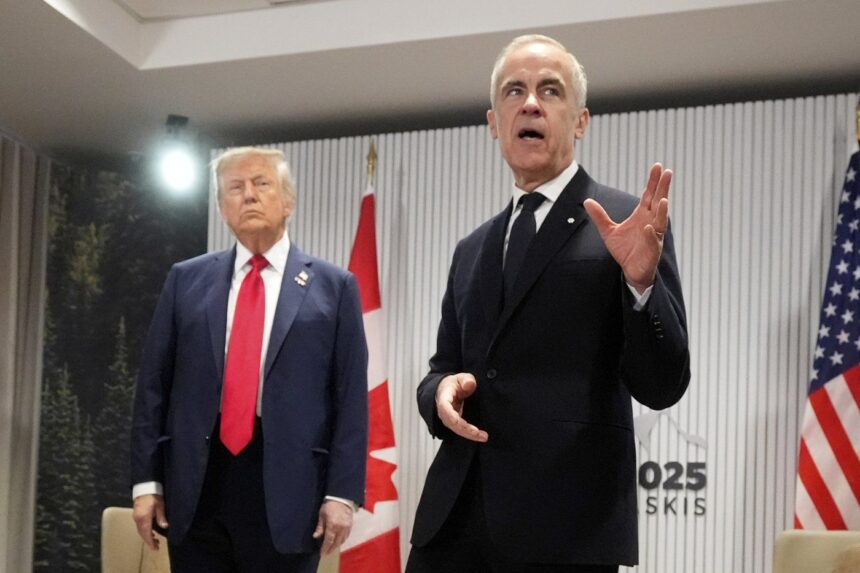Article – A 30-day deadline looms over Ottawa as president-elect Donald Trump signals his administration wants to fast-track a sweeping economic security agreement with Canada that could reshape continental trade for years to come.
Finance Minister Mark Carney confirmed yesterday that American officials have conveyed expectations for hammering out a preliminary deal within the first month of Trump’s January 2025 inauguration – a timeline many policy experts describe as ambitious, if not impossible.
“They’ve made it clear they want movement quickly,” Carney told reporters following a closed-door meeting with provincial finance ministers in Toronto. “The American side has communicated they hope to have framework principles established within 30 days of the new administration taking office.”
The proposed agreement would extend beyond traditional trade to include critical minerals, border security, defense manufacturing, and energy cooperation – sectors Trump repeatedly highlighted during his campaign as essential to American economic independence.
For Prime Minister Justin Trudeau’s government, the compressed timeline creates both opportunity and considerable risk. Sources within the Prime Minister’s Office, speaking on background, admit the government was caught off-guard by the aggressive timeline but recognize potential advantages in securing early certainty with their largest trading partner.
“We’re preparing for intense negotiations,” said a senior government official not authorized to speak publicly. “But there’s something to be said for getting in front of the line before the new administration turns its attention to other trading partners.”
The hurried approach has sparked concern among provincial leaders, particularly in Quebec and Alberta, where resource industries represent significant portions of the economy. Quebec Premier François Legault warned Ottawa against rushing into commitments that might compromise provincial jurisdiction over natural resources.
“We need a deal that works for all Canadians, not just to satisfy an arbitrary American deadline,” Legault told Radio-Canada earlier this week. “Quebec will defend its interests at the negotiating table.”
Trump’s focus on Canada represents a shift from his previous administration’s emphasis on China and Mexico. During a post-election call with Trudeau last month, Trump reportedly emphasized continental security and supply chain resilience as priorities for his incoming administration.
At the heart of American interests lies Canada’s vast critical mineral reserves – elements essential for everything from electric vehicle batteries to defense systems. A recent U.S. Commerce Department assessment identified Canadian mining capacity as “strategically irreplaceable” in several security-sensitive sectors.
Bank of Montreal chief economist Douglas Porter suggests the rapid timeline might actually benefit Canada by limiting the scope for protectionist measures that plagued the previous USMCA negotiations.
“Quick negotiations tend to favor maintaining the status quo rather than massive overhauls,” Porter explained in a research note shared with clients yesterday. “There simply isn’t time to reinvent the wheel in 30 days.”
Canadian business leaders have expressed cautious optimism. Business Council of Canada president Goldy Hyder called the timeline “challenging but clarifying” during a BNN Bloomberg interview.
“Better to know where we stand early than face months or years of uncertainty,” Hyder said. “Our members are preparing contingencies but hope this represents an opportunity to strengthen continental trade rather than restrict it.”
The pressure comes as Canada’s economy shows signs of modest recovery following last year’s slowdown. Statistics Canada reported yesterday that GDP growth reached 1.8% in the last quarter, with trade accounting for nearly half the expansion.
While government officials publicly maintain confidence in meeting the aggressive timeline, internal documents obtained through Access to Information requests show departments scrambling to prepare negotiating positions. A memo from the Privy Council Office dated November 28 directs all ministries to “prioritize Trump administration readiness exercises above all non-essential functions.”
Opposition parties have demanded greater transparency around the negotiations. Conservative Leader Pierre Poilievre criticized the government for what he characterized as “improvised diplomacy” during Question Period last week.
“Once again, the Liberals are caught flat-footed by events anyone could see coming,” Poilievre said. “Canadians deserve to know what’s on the table before this government signs away our economic sovereignty in a rushed deal.”
NDP leader Jagmeet Singh similarly called for public consultations before any agreement is reached. “Working people need a voice in these negotiations, not just corporations,” Singh told supporters at a Hamilton rally on Sunday.
International trade experts note that while 30 days is extraordinarily tight for complex trade negotiations, the timeline might represent an opening position rather than a firm deadline.
“This is classic Trump negotiating tactics,” said Meredith Lilly, former international trade advisor to Prime Minister Stephen Harper and current Simon Reisman Chair in Trade Policy at Carleton University. “Start with an impossible demand and frame anything less as a concession. Canada needs to be prepared but not panicked.”
As preparations intensify, Canadians can expect to see a flurry of diplomatic activity over the coming weeks. Minister Carney confirmed he will travel to Washington next week for preliminary discussions with Trump’s transition team.
“We enter these talks as equal partners with shared interests,” Carney emphasized. “This isn’t about giving in to demands, but finding common ground that benefits workers and businesses on both sides of the border.”
Whether that common ground can be found in just 30 days remains to be seen.






